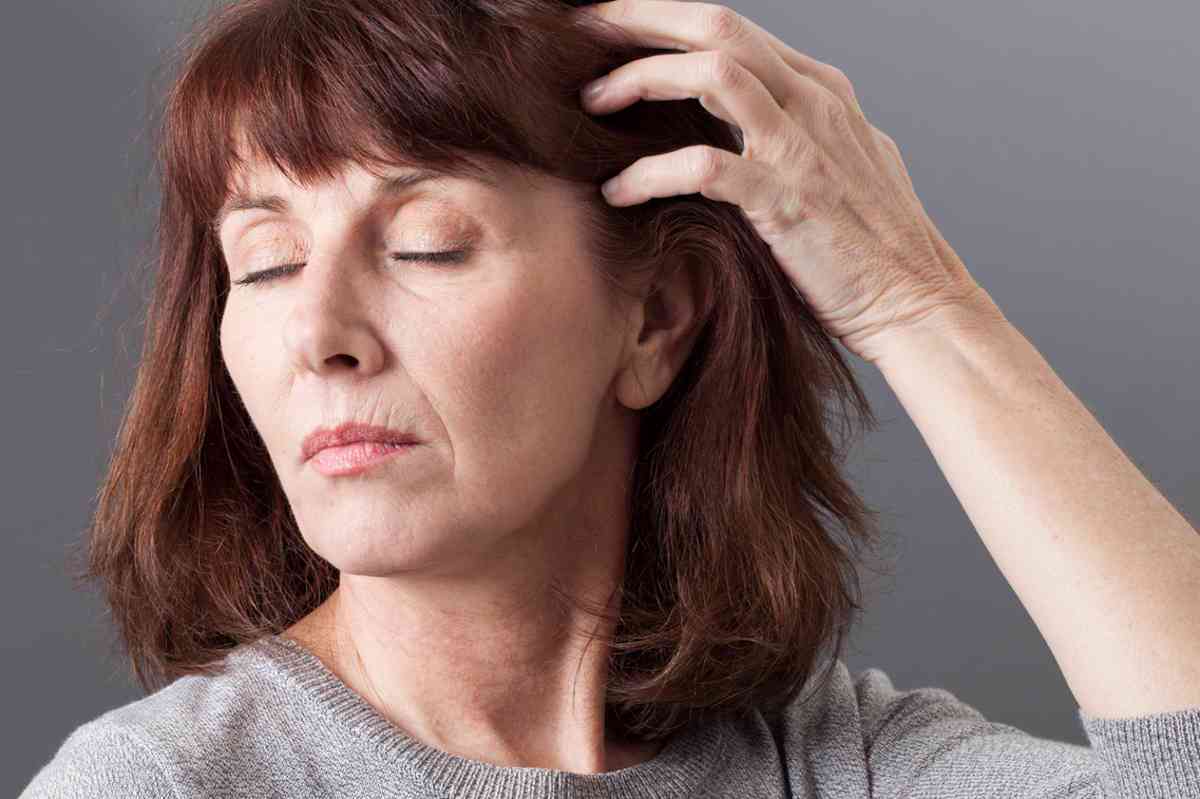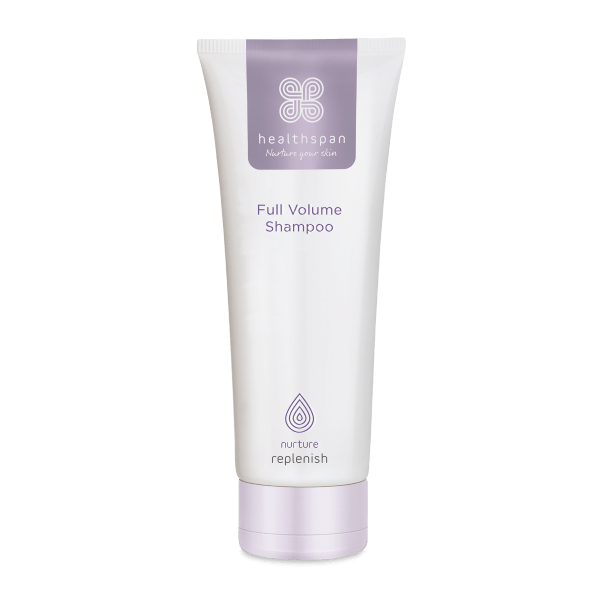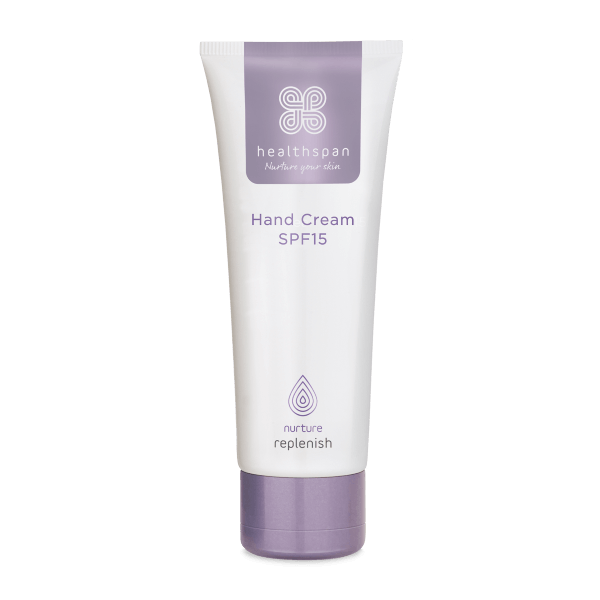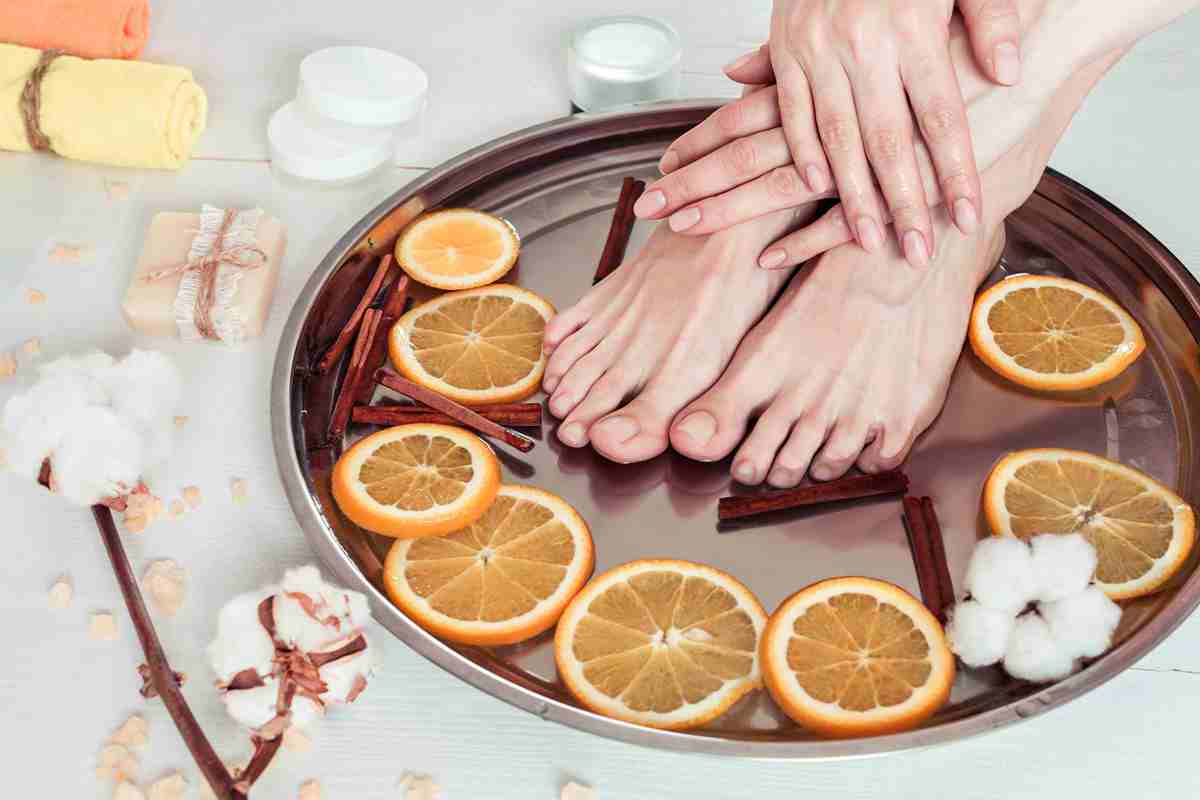Hair loss and brittle nails are common side effects of menopause, but don't worry, there are ways to fix these issues. We've got the best tricks in the book from experts in the field to help you get back your pre-menopausal hair and nails.
Menopause, which all women will go through at some point, is the natural biological process where a menstrual cycle stops due to lower hormone levels. During this time, the body goes through numerous changes adjusting to the hormones. While the most common symptoms include hot flashes and mood swings, menopause also affects your hair and nails. From hair loss, thinning and dry hair to weak, brittle nails. But don't worry; we've got some ways that can help tackle these effects of menopausal hair and nails.
Menopause hair and nails
Glossy hair and strong nails are great indicator of general health, but as oestrogen levels start to dwindle in the years leading up to menopause and after, hair can become dry and lacklustre, and start to thin.
It may also grow more slowly and even drop out. Meanwhile, our nails may become brittle and start to split and chip. Fortunately, there are natural ways to help solve the problem.
"If your nails become very dry and weak, your hair is likely to be showing similar signs of distress because both are made of keratin, a protein formed in the epidermis from amino acids," explains Julie Thornton, a professor in biochemistry at the University of Bradford and an expert in menopausal skin and hair.
A decline in oestrogen also means that skin, including the scalp, gets thinner as collagen is lost. While collagen is not involved in hair fibre, it does affect the follicle and hair growth.
"Think of the hair follicle as a tree planted in the dermis," says Professor Thornton. "If it's not being fed properly it won't thrive so well. Evidence suggests that scalp skin ageing and hair follicle ageing go hand-in-hand, so what's good for skin is good for your hair, too."
Symptoms of menopause hair
"The human scalp contains approximately 100,000 hair follicles, 90 per cent of which are in the growth - or anagen - phase," explains hair dermatologist Dr Nekma Meah, secretary of the British Hair and Nail Society (BHNS). "Normally, we shed between 100 and 150 hairs from our scalp every day - the telogen phase."
This often goes unnoticed, but hormone changes during the menopausal years can affect this process, and the amount of time hair spends in the growth phase decreases from a few years to only a few months, while the length of the telogen phase (time during which hair falls out) increases.
Because oestrogen levels decrease, your hair may lose volume and length around menopause. You may also find your hair breaks more easily, and you may experience hair thinning or hair loss. Most women experience overall hair loss rather than bald spots, so don't worry.
Some signs you may have menopause hair include:
- Your scalp is more visible
- Your parting is wider
- You notice a recession at your temples
- A loss of density around your hairline
- Reduction in hair thickness
- Your hair breaks easier
- You are losing more hair than normal
- Your hair isn't growing as long as it used to

A decline in oestrogen during menopause can cause hair to lose its shine, becoming dry and lacklustre.
How to fix menopause hair
Depending on whether you have dry hair from menopause or hair breakage, thinning and menopause hair loss, we've got ways to help for each.
1. Reduce stress
Try to manage and reduce any stress if you can; stress can raise androgen levels in your body, which, when combined with reduced oestrogen can affect your brain chemistry, causing mood swings and further hair loss. Taking on yoga, breathing relaxation methods, or just taking time out of your day to destress can be effective.
2. Keep your hair natural
Stay clear from dyes and highlights and any hair chemicals, these can further damage your hair follicles. And during menopause, you may be more sensitive to these chemicals. As well, try to limit your usage with heat, such as hair dryers, straighteners or curlers. These can damage already weakened follicles from menopause and can break hair more easily. And finally, when brushing or styling your hair, brush gently with a softer brush – and try not to wear your hair in a tight ponytail.
3. Exercise
Exercising is a great way to not only manage stress but is also key to a healthy lifestyle. It's also great for preventing other symptoms of menopause, including mood swings or insomnia, which can, in turn, help you maintain your hormone balance. Which then affects menopausal hair and promotes healthy growth.
4. Eat well and hydrate
Eating a balanced diet is your best way to fuel your body with the nutrients it needs to help combat menopause hair loss or thinning. Make sure you include whole grains, fruits and vegetables, as well as essential fatty acids which maintain hair health. These can be found in salmon, tuna, flaxseed oil, walnuts or almonds.
Making sure you stay hydrated helps to make sure your body is functioning at full capacity, and it helps to keep your hair well-hydrated as well. So, if you have menopausal dry hair, keeping up on those 8 glasses of water a day is key. You can also double up by drinking smoothies high in vitamins and minerals.
5. Hair stimulants and oils for hair loss
There are a range of hair follicle stimulants and scalp drops and oils that you can usually find in stores which contain a range of minerals and hormones to stimulate hair growth. These are great for those wanting a home remedy for fixing menopausal hair loss or thinning. You can also find hair thickening caffeine shampoo and hair thickening conditioner which targets the appearance of menopause hair loss and thinning to leave your hair thicker and fuller.
6. Hydrating dry hair from menopause
It might sound obvious here, but if you're struggling with dry hair from menopause, keeping it clean, reducing any buildup and conditioning it will help to support your follicles. Dry hair is a common issue for menopause, this might be due to overhydration or underhydration. Therefore, you want lightweight hydration products that won't clog and leave you with greasy hair but won't leave you with dry brittle hair either.

Nurture Replenish Full Volume Shampoo
For hair during and after the menopause
- Added phytoestrogens, pro vitamin B5 and keratin
- Boosts volume and hydrates hair
- Gives a visible shine and silky feel
7. Shampoo like an expert
For menopause hair loss, thinning or dry hair, the key is to look after your scalp, so wash your hair at least every other day, advises trichologist and hair-loss expert Dr Hugh Rushton. "Many people reduce how often they wash their hair because they fear losing more hair."
"The cycle of hair-shedding and growing is a continuous process, though. Washing hair only once a week means there's greater hair loss in one go, fuelling anxiety."
Massage the shampoo onto your scalp and gently spread it through your hair. Avoid scrunching hair as this disturbs the fine cells that overlap like roof tiles on the outside of each hair, making breakage more likely.
Finally, use a wide-toothed comb rather than a brush, so hair doesn't get tangled, advises Dr Rushton.
8. Talk to your doctor
Talking to your doctor or seeing a dermatologist is a great idea to help you tackle menopausal hair. Blood tests can establish any underlying issues, or if it's just hormonal, and professionals can then guide you in the right direction; this could be through providing medications, vitamins and supplements, or HRT for hair loss.
HRT, also called Hormone Replacement Therapy, restores your body's oestrogen levels to pre-menopause. This also relieves any symptoms from menopause, such as hot flashes, mood swings, and hair thinning or loss. Before you go ahead with this, let it be a last resort and talk to your doctor first, as there are other options, such as supplements which can help.
Supplements for menopausal hair
There are a few supplements for hair loss which can help combat any thinning issues due to menopause. These are:
- Iron: Iron supplements help to combat low levels of iron, which is one of the most common deficiencies in women with thinning hair. But make sure you are low in iron before taking these, as too much can be harmful.
- Vitamin D: Helping with everything from our bones and muscles to teeth and immune system, vitamin D supple-ments can also help subside the symptoms of menopausal hair loss.
- Zinc: Great for hair health, zinc supplements are often recommended for hair loss.
- Biotin: Known as the beauty B vitamin, biotin helps to promote healthy-looking hair and plays a vital role in hair growth and repair.
- Omega 3: With oils that promote healthy hair follicles for menopause hair, omega 3 supplements may help. There are also Omega 3 options for vegans available without the fish oil.
- Co Q10: Known to increase blood flow which can help support hair follicles, Co Q10 supplements can help to stimulate and produce types of hair keratins, especially those which are reduced during menopause and ageing.
"Proteins, essential fatty acids, vitamins and minerals are key constituents of hair and are needed for healthy growth," explains Dr Meah. "Deficiencies in these can lead to changes in hair colour, hair loss and fragility.
"The role of micronutrients, such as vitamins and minerals (vitamin A, C, D, E, iron, selenium, biotin and zinc), have been investigated, and we know people who are deficient in iron or vitamin D may experience acute hair loss, a condition known as telogen effluvium.
"The nutritional deficiency needs remedying, but the hair loss has to be treated either topically or with prescription pills from a dermatologist."
Menopause and nails
Post-menopause, our nails may also change, becoming more brittle (a condition known as onychorrhexis), developing vertical ridges (longitudinal striations) or splitting (onychoschizia), says consultant dermatologist Dr Rhiannon Llewellyn, a specialist in nail disease and a BHNS member.
Symptoms of menopausal nails
Hormonal imbalances, dehydration or lack of essential vitamins can all cause the same symptoms. You may find that with menopause nails you'll experience:
- Splitting and breaking nails more often
- Brittle or thin nails
- Different shape or texture as normal such as vertical ridges
- Changes in nail colour
Remedies for menopausal nails
If you're struggling with brittle nails from menopause, splitting or ridged nails, there are ways that you can combat and fix it, such as:
1. Use moisturiser
If you're struggling with menopausal brittle and thin nails, moisturising your hands and nails after washing them will help to nourish them. Hand creams usually have vitamins and minerals great for the skin and nails in them, such as vitamin E and B5.

Replenish Hand Cream SPF15
Rich and nourishing cream for mature hands
- Helps give hands a more youthful appearance
- Helps restore skin density
- Includes pro-vitamin B5 for its skin and nail conditioning benefits and antioxidant vitamin E to protect against sun damage.
2. Protect your hands and nails
Make sure to have gloves to wear to protect your hands and nails from various tasks. This could be daily use gloves for when it's cold outside to keep needed moisture in. Use washing-up gloves or cleaning gloves to protect your skin and nails from harsh chemicals or drying out – which can damage your nails even more.
3. Pamper your nails
Nail polish adds a layer of protection to your nails, so can help prevent nail breakage from menopause. You can also find clear nail polish with oils to promote nail bed strength, which can help combat brittle and thin nails from menopause.
4. Avoid acetone
On the topic of nail polish, it's important to avoid any nail polish removers with acetone in them, as this can dehydrate already dehydrated nails, causing thinner nails. It's best to either let the nail polish remove on its own or find a kinder remover without any harsh chemicals.
5. Fuel and hydrate your body
Like with hair, it's important to give your body what it needs to nourish your nails during menopause. Eating a well-balanced diet with plenty of fruit and vegetables plus vitamins and minerals can do wonders. Include foods rich in omega 3, vitamin C, protein, folic acid and calcium to help nourish your nails.
And like you must hydrate your skin and nails, hydrating your body is key to help aid that. Drinking eight glasses of water can help your body retain the moisture it needs for healthy skin and nails through reduced estrogen.
6. HRT and menopause nails
If you are considering HRT and whether it would help with brittle and thin nails or breakage issues, it might have a massive effect. But as spoken about before, HRT helps greatly with hair loss and other menopause symptoms as it reverts the hormonal changes. But speak to your doctor about HRT and your concerns with menopausal nails specifically, as they might recommend a better fit for you, such as medication or vitamins.
Supplements for menopause nails
Through menopause, you experience a dip in hormones which can affect your nails, but there are ways to help combat this through taking a supplement. These help to give your body what it needs to keep your nails strong. Here are some great nail vitamins you could take:
- Iron: as stated before, iron helps with the strength of hair and nail follicles, so if you're low in iron, you might find you have hair thinning and brittle nails. Taking an iron supplement for your nails might help.
- Vitamin D: another common vitamin for nails and hair, this can help strengthen your nail beds.
- Calcium: calcium supplements help to promote and maintain strong and healthy bones and strengthens hair and nails. It also works well with vitamin D, which helps absorb the calcium.
- Selenium: selenium supplements support nail and skin health alongside hair, immunity and thyroid functions.
- Vitamin B: found as riboflavin (B2) and Biotin (B7), these can promote healthy cell growth in nails and help to strengthen brittle and thin nails from menopause.
- Vitamin E: usually found as a supplement or nail care oil, this acts to protect your nails against damage while deeply hydrating and healing your nail plates and cuticles.
- Collagen: collagen supplements are vital to supporting your skin and soft tissues in your bones. This usually declines as we age, especially during menopause. Taking these supplements can not only help with weak brittle nails but also help with your skin's elasticity, smoothness and firmness.
"The nails are highly susceptible to nutritional deficiencies, and changes in colour and texture," says Dr Llewellyn. The most common deficiencies are iron, vitamin D and riboflavin (vitamin B2), which can all make nails more fragile.
Vitamin D deficiency can lead to soft nails (hapalonychia) that peel and bend easily. Brittle nails are the most common problem post-menopause, but nail hardeners and biotin (vitamin B7) supplements can be helpful.

Vitamin C, along with vitamin E, beta-carotene, selenium and magnesium, is important for healthy hair and nails.
Fixing menopause hair and nails
If you're going through this big hormone change, don't worry, as the changes are only temporary, but you can help subside the symptoms of menopausal hair loss and brittle nails easily. From simple tips to incorporate into your daily life to simply bumping up your vitamin and mineral intake with supplements or using medical stimulates or oils.
It can be overwhelming with all the different supplements your body may need to replenish what was lost with the hormone changes, to make it easier, you can find nail and hair supplements that have all you need. Or specifically for this time in your life, we have a range of menopause supplements which can help with various other symptoms.







